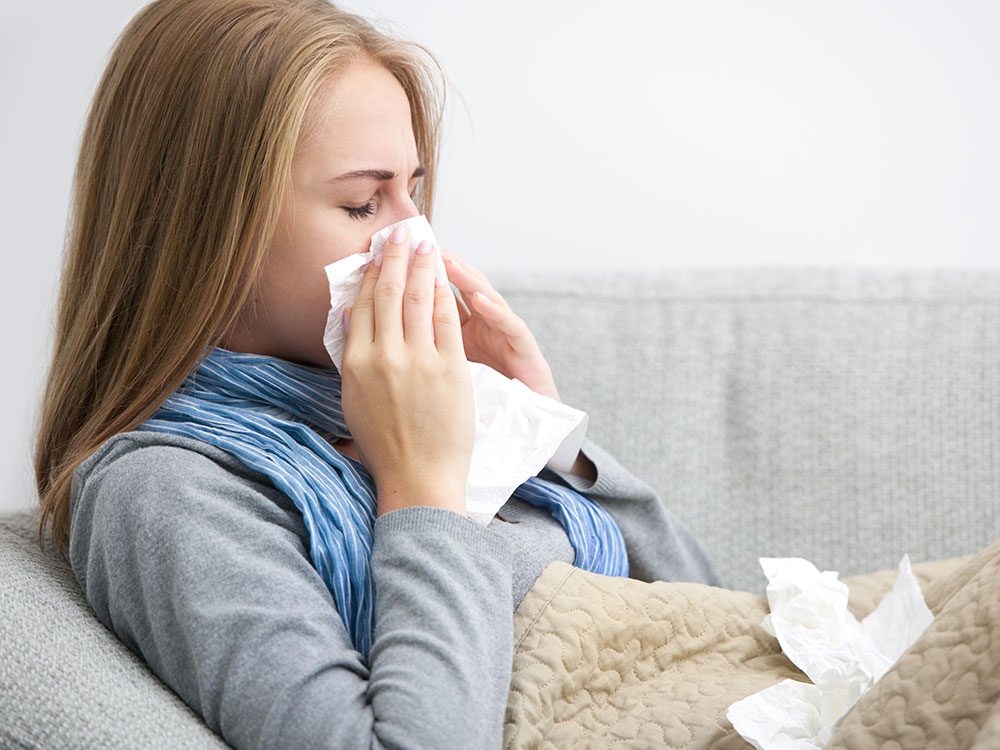How Long Does a Cold Last?
If you’ve caught a cold, you’re probably wondering how long the agony will last. Well wipe your nose and keep reading, because we have answers.

What exactly is a cold?
“The common cold is a viral infection of your nose and throat (upper respiratory tract). It’s usually harmless, although it might not feel that way,” say the experts at the Mayo Clinic. Common colds are the main reason your kids miss school and you miss work. The Centers for Disease Control and Prevention (the CDC) reports that millions of people get the common cold every year in North America, with adults averaging two to three per year. Children average even more than that, and children under the age of six are especially susceptible. (Here are 10 Ways to Beat a Cold.)
How are colds spread?
Forget what your mom said about catching a cold from going outside with wet hair—it’s not true. The common cold is caused by a virus. In fact, there may be as many as 200 viruses that cause common cold symptoms, with rhinovirus being the most common, according to Megha Tewari, MD, family practice and geriatrics physician with Memorial Hermann The Woodlands Medical Center, who tells Reader’s Digest that cold viruses spread through the air, through bodily fluids, and from touching surfaces on which virus particles have settled. That said, your mom wasn’t completely wrong: Weather or temperature changes and being out in the cold weather without dressing warmly stresses the body’s immune system, rendering you less capable of fighting off a cold virus. “Any kind of stress can make you more susceptible to catching a cold,” Dr. Tewari points out.
How long does a cold last?
Most people fully recover within seven to 10 days, but Dr. Tewari breaks down the length based on your symptoms:
- sore throat: usually runs its course within the first day or so
- mild headache: usually resolves within a few days
- mild body ache: usually resolves within a few days
- low-grade fever: usually resolves within a few days
- fatigue: may linger for the first week to 10 days
- nasal congestion: may continue for one to two weeks
- coughing: may continue for one to two weeks
If you’re a smoker or exposed to second-hand smoke, your cold symptoms could last even longer. In addition, people with weakened immune systems, asthma, or conditions that affect the lungs and breathing passages may develop more serious health conditions in addition to the cold (such as pneumonia and bronchitis).
What to watch out for
The discharge from your nose may become thicker and yellow or green in colour as a common cold runs its course, but this shouldn’t be cause for alarm. However, you should see your doctor if you experience any of the following:
- a temperature higher than 100.4° F
- symptoms that last more than 10 days
- symptoms that are severe or unusual
The cure for the common cold
Sorry, there’s still no cure. Antibiotics won’t make it better, and there’s no vaccine. All you can really do, according to Dr. Tewari, is to rest and hydrate, and once your immediate symptoms pass, she says, you should be able to return to work.
To protect yourself from getting a cold in the first place, keep your hands clean and away from your eyes, nose, and mouth, and steer clear of people who seem like they have colds. To protect others from getting your cold, stay home for as long as you can while you’re symptomatic, and make sure to use proper etiquette while sneezing—blow into a tissue, or you elbow, not your hand!
You’ve heard the expression, “Feed a cold, starve a fever”? It turns out These 8 Foods Can Help Relieve Cold Symptoms and Speed Up Your Recovery!



